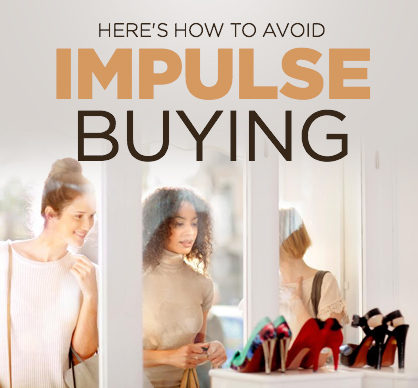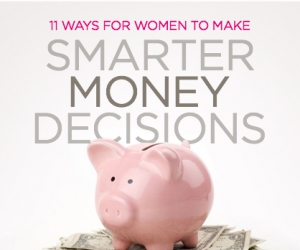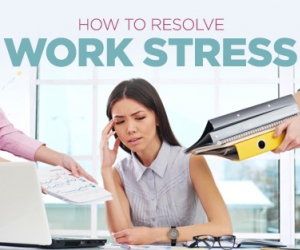Fend Off Impulse Buying with These Tips
Don’t use shopping to fill a void
For some people, shopping is an irresistible habit. But when impulse buying threatens your savings and financial well being, it’s time to take a strong look at your buying patterns and figure out if you’re wasting money on unnecessary items.
If you are a compulsive shopper, there is help through therapy and other means.


Compulsion vs. habit
First, figure out if it’s a compulsion or a habit. Jeanette Raymond, a psychologist, said that she finds her clients tend to impulse shop when they have been let down by someone they love and they’re left feeling devalued and disappointed.
“They experience disappointment and anger. Those feelings cut off connection with the reasoning center of the brain. They are hijacked by an immediate powerful need to make up for what they expected and didn't get, and buying is a very seductive and instantly gratifying way of compensating for that let down. It's the act of giving to yourself with no censorship that acts like an addiction, with the goods that are bought being secondary,” Raymond explained.
It is common for people who are unable to sustain lasting relationships to be more prone to impulse purchases. “The problem is that it isn't satisfying the role that relationships would, so they are not truly satisfied and continue to react to impulses because they can't handle relationships. It's a way of self-medicating by getting a short 'high' and feeling in control, only to crash soon after,” she said.
Just because you make a few impulse purchases doesn’t mean you’re a compulsive shopper. The deciding factor is whether it’s impacting other areas of your life, such as limiting your ability to save money and purchase other necessary items, said Darla DeMorrow, a professional organizer with HeartWork Organizing who said she sees many variations on impulse buying in her job.
If you want to reduce impulse buying, you can start with observing your own behavior and its consequences. Mindfulness techniques can help. Natural consequences like tripping over too many boxes at home can be a wakeup call. Having to hire a professional organizer and spend money to clear out items that you spent too much money on is a cry for help and a recipe for change,” DeMorrow said.
“For those who really want to make a change in their behavior, simple steps can be effective. Find other activities to do so you don’t find yourself in shopping mode. Stay out of the stores. Don’t watch the shopping channel. Stay off of Amazon. The more you frequent these places, the greater are the chances that you’ll make unplanned purchases,” she said.
“Studies show that we fear the loss of something more than we appreciate the gain of something. It’s how our brains are wired. A good resource for this is Kelly McGonigal’s book The Willpower Instinct. As a result, having a goal of accomplishing something besides impulse buying can be helpful, but it has to be a really magnetic and strong goal. For some people, just knowing this key bit of brain physiology can be helpful in reshaping their motivations. Bottom line, this is a complicated issue that can be skin deep in some and can require counseling and therapy for others,” she said.

Tips on avoiding impulse shopping
Andrea Woroch, a nationally-recognized consumer-savings expert, shared her tips about how to avoid impulse shopping:
Would you pay full price
If sales and markdowns tempt you into spending, ask yourself if you'd buy the item at full price. If the answer is no, you don't need it and should move on.
Walk away and think it over
When you find yourself faced with an impulse buy, it’s important to give yourself time to think it over so you don’t go home and get stuck with something you don’t need or can’t return. If you’re confronted with an impulse item, walk away from the item for at least 10 minutes. Chances are the impulsive desire to buy will pass during this time out. For larger items, like an HDTV, give yourself 24 hours so you can think it over, read reviews and assess your budget.
Delete payment information
Online and mobile shopping makes buying on impulse an even easier thing to do and a bigger problem. One way to avoid the instant purchase with one tap of the finger or one click of the mouse is to delete any stored payment information on favorite sites or apps. The time it takes you to reenter your billing information or look for your credit card will often be enough to make you realize it’s not something you really need or have the money for.
Fill up your cart, then close your browser
Sometimes when I feel the urge to shop online, I pull up my favorite website and browse new items or sales and fill up my cart with wish list items. Then, I close my browser and walk away. Sometime the simple act of just filling up my browser fulfills that urge to shop.
Identify your spending triggers
Do you shop when you’re feeling happy or sad? Or do you shop when you’re bored. Identifying such impulse shopping triggers is key to nipping it in the butt. Find other activities that you can do that don’t cost money and that are actually healthier for you. Go for a brisk walk or to an aerobic class. If you’re bored, head to the library and look up a new book or check out a local art exhibit instead. What’s more, if you and your friends or family spend the weekends or free time browsing, it’s time to find a new activity to bond over because window shopping often leads to impulse purchases.
Unsubscribe
Daily and weekly e-newsletters offering the hottest trends and biggest sales of the year aren’t only distracting, but they tempt you into spending on impulse. Unsubscribe from these emails and use a mobile coupon app like CouponSherpa to look for the sales when you are actually heading to the store and need to find a deal.
Pay with cash and carry large bills
A Dunn & Bradstreet study found that people spend 12-18% more when using credit cards than when using cash. With cash, spending more than you intended requires going to a bank or ATM. For most, this provides time to reconsider the purchase and whether their budgets can handle any extra strain. Also, carry large denominations of dollar bills like $50's and $100's as many studies show that people are less likely on break a big bill on small purchases.
Use a basket instead of the cart
Ever notice how those shopping carts seem to get bigger and bigger. They’re designed to entice you to fill them up with more goods! The bigger the cart, the less full it feels and the more compelled you are to fill it with things you likely don’t need. At least not now. Get in the habit of using a hand basket or one of the smaller shopping carts if offered at your grocery store. The heavy and more full the basket gets, the more aware you will become of the contents and help you realize there are things you don’t need.
Go grocery shopping less
Grocery stores make 50% of their profits on your impulse purchases. Make sure you shop with a detailed list and meal plan so you can prepare for a week of food in just one shopping trip to eliminate the amount you spend on impulse. If you can reduce your grocery shopping to just two times a month, even better.
Jot down a list
This is a common tip but one of the best to use to help you get in and out of a store quickly with only what you need.
Whatever you choose to do, if you learn to manage your shopping habits and spend less, you'll feel less of a financial strain in your day-to-day life and the burden of being a shopaholic will lift.
Tagged in: money, spending, compulsive shopping, impulse buy, shopaholic,


